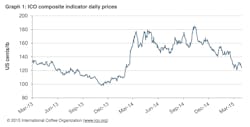Coffee Market Settles Lower But Demand Remains Buoyant, March 2015
The coffee market fell for the fifth consecutive month in March 2015, as speculation over the size of the upcoming 2015/16 Brazil crop continues to mount. Exports in February were lower compared to last year, as shipments from both Brazil and Vietnam dropped off, with total exports for the first five months of the coffee year down 2.7%. Production is estimated at around 141.9 million bags in crop year 2014/15, while an initial estimate of world coffee consumption in calendar year 2014 comes to 149.3 million bags, suggesting resilient demand for coffee worldwide.
The ICO composite fell further in March 2015, with the monthly average down 10% compared to February to reach 127.04 US cents/lb. This is its lowest monthly average since January 2014. Daily price movements showed no clear trend over the course of the month, hitting a low of 120.50 and a high of 131.78 but finishing at around the same level it started. Price volatility was also notably higher in March compared to last month.
The three Arabica groups all dropped by over 10% on February, while Robustas were 6.3% lower. In terms of the price differentials, Other Milds increased their premium over Colombian Milds by over a third to 6.45 cents, while the arbitrage between Arabica and Robusta narrowed to 56.76 cents, compared to nearly 70 in February, also the lowest since January 2014. If this trend continues, it could lend some support to Arabica prices going forward.
Total exports in February 2015 came to 8.6 million bags, down 10.2% on February 2014. This brings world exports for the first five months of the coffee year (October to February) to 43.4 million bags, 1.2 million bags less than the same period in 2013/14. Shipments from Brazil dropped for the first time in fifteen months, as they come towards the end of their crop year, while exports from Vietnam are also estimated lower.
An initial estimate of world coffee consumption in calendar year 2014 comes to 149.3 million bags. This represents an average annual growth rate of 2.3% over the last 4 years. The strongest growth over this time has been found in emerging markets, averaging 4.6% since 2011, with particularly strong demand in Russia, South Korea, Algeria and Turkey. Exporting countries have also been recording increased demand, at an average of 2.6%. Brazil is by far the largest coffee consumer among the exporting countries, on 20.8 million bags for 2014, followed by Indonesia (4.2 million), Ethiopia, (3.7 million) and Mexico (2.4 million).
Traditional consuming markets, such as the EU, USA and Japan, account for over 50% of the world total, but have been growing at a more modest rate of 1.5% in the time period. It is thought that the move towards specialty coffee consumption and single-serve pod machines is increasing the value of demand more than the volume, although the USA and Canada are still exhibiting considerable market growth.
In terms of the geographical distribution of coffee consumption, Africa and Asia have been recording the most dynamic growth, of 5% and 4.5% respectively, although they account for only 7% and 19% of the world total. Central America and Mexico are mostly unchanged over time on around 5 million bags, or just over 3% of the world. Europe has recorded relatively modest growth over time, averaging a 0.8% increase per year, while North America has registered 2.6% over the time period. Coffee consumption in South America has grown at a steady 2.0% to reach 25.4 million bags, 17% of the world total.
In summary, world coffee demand continues to show significant growth, with considerable potential for further increases. More mature markets such as the EU are relatively stable, while emerging markets, particularly in Africa and Asia, are recording significant increases, albeit from a relatively low base.
